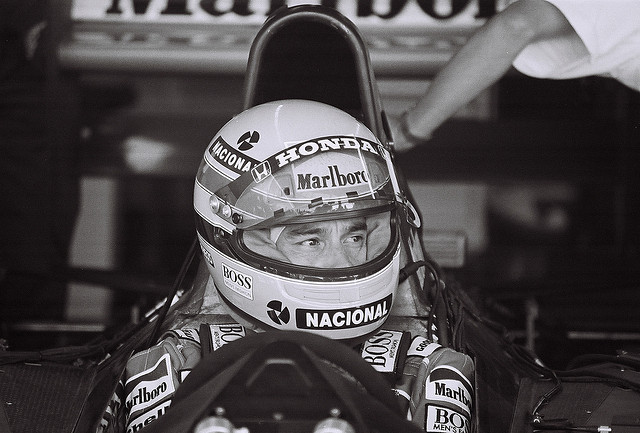“Actually, he was an even greater man outside the car than he was in it” – Frank Williams
Much like the great Pyramids of Egypt, the Statue of Liberty or the Roman Coliseum, Ayrton Senna is a name engraved in history.
Never has a sportsman transcended the world of sports and celebrity to become a global superstar and a national treasure quite like the charismatic Brazilian.
Known for his extreme racing ability behind the wheel as well as his charitable and kind nature, Ayrton Senna was greeted like a god when he stepped foot on to his home soil.
His popularity was such that in 1994, the Brazilian national football team dedicated their World Cup win to the three-time Formula One champion just two months after his tragic death. It speaks volumes that Senna’s grave attracts more visitors than John F. Kennedy, Marilyn Monroe and Elvis Presley combined.
Formula One has always been known for its outlandish playboys. Eddie Irvine and James Hunt, just two examples of the kind of ill-tempered, attention clasping, celebrity embracing character that has come to define many involved in the high risk sport.
Senna however sought to alter this reputation throughout his career.
Legendary commentator Murray Walker best described Senna when he said: “Not only was the Brazilian a truly great driver – one of the very best there has ever been – but he was also a remarkable human being, who could be utterly ruthless in one part of his life but also incredibly giving in another.”
The stats speak for themselves, 65 poles in 141 races, more wins at Monaco than anyone else and three World Championships, but the numbers don’t reveal the whole story. His ruthlessness that came in the form of a fiery temper and a burning desire to win are the reasons for his success.
At the 1990 Japanese Grand Prix, the setting for one of his most infamous outbursts, Senna took things into his own hands after he was denied his request to have the side of the grid that gave the racing line advantage, despite achieving pole position.
Going into the first corner, the Brazilian drove straight into Prost, consequently taking both drivers out of the race and securing his second World Championship.
His talent in a car will always be remembered, but his demeanour away from the sport is what cements his legacy.
After his death it was revealed that he had secretly donated an estimated $400 million of his own money to children’s charities and upon examining the wreckage after his disturbing accident, officials found an Austrian flag, a flag that it was thought he had planned to wave in tribute to Roland Ratzenberger, a fellow Formula One driver who had lost his life one day prior in qualifying.
His generosity and kind nature could not be confined to his personal life and in 1992, at the famous Spa-Francorchamps in Belgium, his selfless heart spilled onto the track.
After he saw Frenchman Erik Comas struggling for life and with blatant disregard for his own, Senna jumped out of his McLaren and ran across the track as the rest of the grid continued to speed past him, switched Comas’s engine off and held his head in a stable position until the doctors arrived.
Formula One has always been known as a dangerous sport, in the 50s and 60s each drive was a risk drivers took to be crowned World Champion. After Senna’s passing at Imola in 1994 significant changes were made to the sport in terms of safety precautions, changes that make Senna’s untimely death the last fatality F1 has seen.
In the races following the San Marino Grand Prix, measures such as a curve at the exit and entrance of the pit lanes to ensure drivers slowed down and the creation of the FIA Institute for Motor Sport Safety were put in place as well the Grand Prix Drivers’ Association.
Ayrton Senna stamped his personality all over the sport of Formula One and it has not been forgotten. In 2010 Asif Kapadia directed ‘Senna’ a 100-minute documentary, a testament to his the man that has been described my many as the greatest driver ever to have graced the Formula One scene.
His legacy lives on today also in the form of his nephew Bruno Senna, a former Williams’s team member and perhaps a future F1 star, and his sister Viviane, who runs the Senna foundation a charity that benefits over two million young children in Brazil.
The man that many dubbed ‘The Rain Man’ paid the ultimate price for his sport, but his legend will never be forgotten and his role in the sport continues to have an impact 18 years on from his untimely death.
By Jamie Bassett
This photograph was provided by StuSeeger




















Pingback: Formula One Belgian GP: Preview - TIBS Sports News